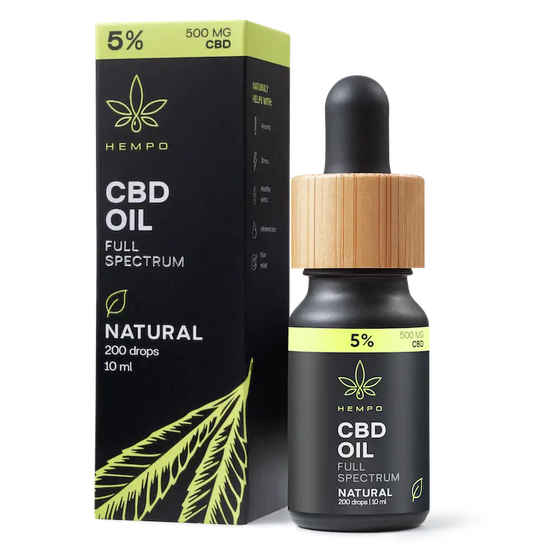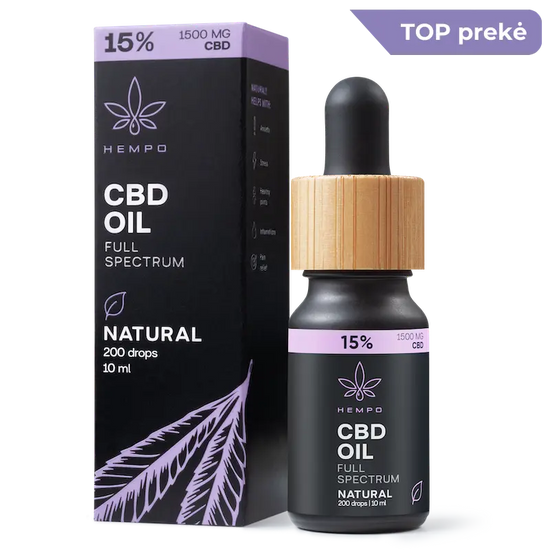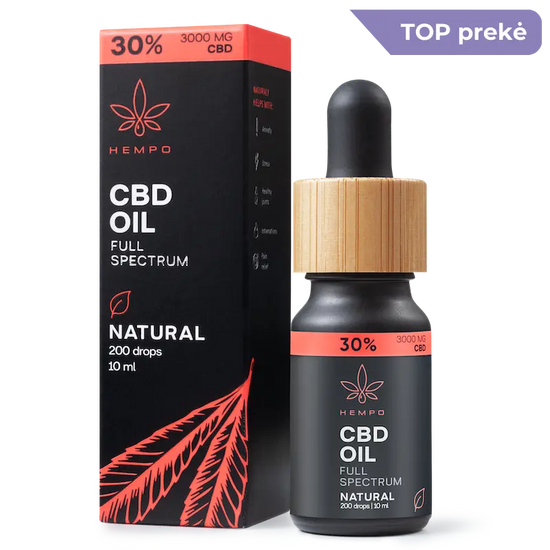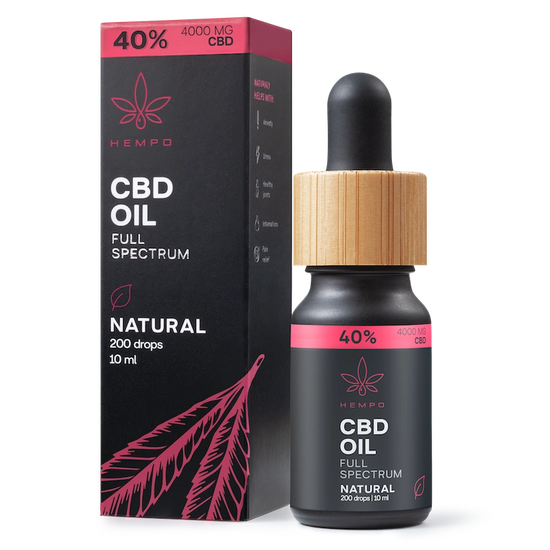Hemp oil: medicinal properties worth knowing
Hemp seed oil is a product extracted from industrial hemp through cold pressing. It is rich in beneficial fatty acids, such as Omega-3 and Omega-6, which give it numerous health benefits. Hemp oil can also be used in cooking.
Hemp oil and its healing properties have been known since time immemorial. Archaeological finds and historical sources testify that people have used hemp for thousands of years as food and medicine. Hemp was one of the first plants to be cultivated.
The benefits of hemp are shown not only by ancient wisdom, but also by modern studies of the plant's constituents and nutritional profile. Scientists and medical professionals distinguish the multifaceted health benefits of hemp.
We invite you to familiarize yourself with the most important benefits of hemp oil. We have no doubt that this will help ensure that hemp has something for everyone!
Table of Contents
Note: This and other articles on Hempo's blog are for informational purposes only. According to the directive of the European Commission, cannabidiol is classified as a 'novel food', therefore CBD products should not be used as a food supplement in Lithuania.
What is Hemp Oil?
Hemp oil, derived from hemp seeds, is a natural and versatile product in the health and wellness field. Often confused with CBD oil, hemp oil is quite different, as it does not contain the psychoactive compound THC. It is extracted by cold pressing hemp seeds, a process that ensures the preservation of its nutritional value. Rich in essential fatty acids, such as Omega-3 and Omega-6, hemp oil offers numerous health benefits. It is known as a heart-healthy product, as the omega fatty acids it contains can help reduce blood cholesterol levels. Additionally, due to its anti-inflammatory properties, hemp oil is a popular choice for skincare, capable of alleviating conditions like acne, eczema, and psoriasis. Hemp oil also stands out for its antioxidant properties, which help boost immune health. As a source of plant-based protein, it is a suitable supplement for vegetarians and vegans. When considering hemp oil, it is important to distinguish it from CBD oil, which is extracted from the leaves, flowers, and stems of the hemp plant and has different compounds and benefits. For those seeking a natural dietary supplement, hemp oil is a nutrient-rich option with a wide range of applications in health and wellness.
What's in Hemp Oil?
The healing properties of hemp oil are manifested due to the unique composition of this product. It is worth noting that there are many different variations of hemp oils, currently the most popular are probably two hemp oils with different composition and effect.
This is hemp seed oil (CBD) and the oil pressed from hemp seeds.
Let's discuss both of these products:
CBD hemp oil
It is extracted from the fibrous stems and flowers of hemp. The most important component in its composition is CBD . It is a safe, natural cannabinoid found in fibrous hemp that is prized for its calming, anti-inflammatory properties. Once inside the body, CBD oil interacts with the endocannabinoid system, which transmits impulses to the central nervous system. It is naturally present in the body of humans and some animals. It is a complex biological system consisting of cannabinoid receptors and endocannabinoids. It is manifested throughout the body: from the brain to the organs and connective tissues.
Hemp seed oil
It is valued for its minerals, building proteins, vitamins and trace elements that are useful for the whole body. Hemp seed oil is rich in polyunsaturated fatty acids omega 3 (alpha-linolenic acid) and omega 6 (linoleic acid), which are classified as healthy fats. This oil is practically free of CBD, THC and other active cannabinoids, since these compounds are not formed in the seeds (or in minimal amounts).
Types of Hemp Oil
- Unrefined Hemp Oil: This oil is extracted from hemp seeds without thermal or chemical processing, retaining its natural flavor and green color. It is rich in nutrients but has a shorter shelf life since it is unprocessed.
- Organic Hemp Oil: Certified organic, this oil ensures that no pesticides or synthetic fertilizers were used during the cultivation of the hemp plant, resulting in a pure, chemical-free product.
- Cold-Pressed Hemp Oil: Produced by mechanically pressing seeds at a low temperature, this method preserves sensitive compounds and nutrients, making it a high-quality choice in terms of nutrition and health benefits.
- Filtered Hemp Oil: Refined to remove impurities and sediments, this oil has a lighter color and milder flavor. It is often more palatable and has a longer shelf life, though it may contain fewer nutrients compared to unrefined or cold-pressed hemp oil.
Each type of hemp oil has unique characteristics, so when choosing an oil, it's important to consider personal needs and intended use. Whether it's the highly nutritious unrefined hemp oil, an organic option free of chemical additives, cold-pressed oil that retains all sensitive compounds and beneficial nutrients, or filtered oil that is ideal for culinary use due to its mild taste and extended shelf life—the choice is yours. Understanding these differences is key to maximizing the benefits of hemp oil for both health and culinary purposes.

How is hemp oil used?
Hemp oil is a versatile product with various uses that cater to different needs. In the culinary world, it is a nutritious addition often drizzled over salads or mixed into smoothies for its flavor and health benefits. It is not suitable for high-temperature cooking but is excellent for enhancing cold dishes.
Hemp oil also has positive effects on joints - most commonly used topically, applying the oil to problematic (painful) joints. Its anti-inflammatory properties make it a popular choice for those seeking natural joint pain relief.
Additionally, hemp oil is used as an ingredient in cosmetics and is known for its moisturizing and skin-balancing properties. It is found in products such as lotions, serums, and soaps.
Hemp oil is often mixed with CBD (cannabidiol) due to their complementary positive properties, further enriching this extract.
Benefits of the of hemp oil
Hemp oil has many benefits for the body. Let's discuss the main healing properties:
Strengthens immunity, fights inflammation
The body is constantly affected by external factors that can weaken immunity and cause inflammatory processes. To prevent this or to fight the inflammation that has started, it is worth trying hemp products.
Both CBD and hemp seed oil have an anti-inflammatory effect, so they are suitable both prophylactically and for various chronic diseases: rheumatoid arthritis, diabetes, oncological diseases, etc.
Hemp seed oil has an optimal balance of fatty acids. These components strengthen immunity, increase the body's resistance to bacteria, viruses and other dangerous microorganisms.
Helps to recover faster after physical training
A common sensation that is familiar to people who like to do sports is body fatigue, muscle tension, swimming.
CBD oil helps relieve pain and discomfort. If the pain is local, the oil can be used externally: by massaging the painful area of the body. This helps to improve blood circulation, and the hemp oil that has penetrated through the skin quickly relieves unpleasant sensations and helps the body recover faster.
Both active sports people and those who want to maintain good health are also worth trying hemp seed oil, which has a high protein content. It is an important building material of the body, which is responsible for cell regeneration processes, helps maintain good condition of muscles and connective tissues, and increases physical endurance. Microelements such as calcium, magnesium, potassium support stable blood pressure and good bone health.
Hemp oil for sleep
If you suffer from insomnia or have a hard time falling asleep, you've probably tried many solutions to no avail. Hemp oil for insomnia is a natural remedy that has been tested by time and people and almost guarantees good results. According to a study published in the Permanente Journal, 79.2% of participants reported a reduction in anxiety levels after using CBD oil, and as many as 86.7% of participants reported falling asleep faster and waking up more rested. These numbers are not mere guesswork; numerous other clinical studies have shown similar results, only further proving that the cannabinoids in hemp oil interact with your body's endocannabinoid system to help regulate factors such as mood, stress, and sleep cycles. When it comes to insomnia and sleep disorders, hemp oil works by stabilizing cortisol levels in the blood, thereby promoting a state of calmness and improving sleep quality.
Hemp oil for stress and anxiety
If you've been feeling stressed, anxious, angry, or just plain unhappy lately, you're probably looking for a solution that not only promises, but also delivers results. Hemp oil for stress is a topic that has been actively discussed for well over a decade, and the positive results are confirmed by hundreds of thousands (maybe millions) of happy people who have been helped by cannabidiol.
A study published in the journal "Journal of Clinical Psychology" in 2019 found that even 77 percent participants who took CBD oil reported a significant reduction in anxiety. This is not a placebo effect; hemp oil interacts directly with serotonin receptors in the brain, producing a calming effect that helps reduce stress and anxiety. But don't just take our word for it. Numerous testimonials from users of hemp oil support these findings, highlighting its effectiveness in reducing stress and anxiety. Even more compelling, the benefits of hemp oil include mood stabilization and potentially better sleep quality, which often suffers when you're stressed. So if you're looking for a simple, fact-based method of stress management, hemp oil is a scientifically proven alternative that you should seriously consider.
Benefits of hemp oil in cancer
If you're interested in hemp oil because you've heard about its benefits for cancer, you're on the right track; numerous scientific studies support the use of hemp oil as an additional method in the fight against oncological diseases. In fact, more and more family doctors are now recommending cannabidiol oil as part of a holistic cancer treatment plan. A review published in the journal Frontiers in Pharmacology confirms that cannabinoids can effectively reduce chemotherapy-induced nausea and vomiting. In addition, it has been scientifically proven that hemp oil strengthens immunity - this is especially important when chemotherapy is used, during which the patient's immune system is severely weakened. Patients also report improved appetite with hemp oil, a common side effect of cancer treatment that can affect food intake. A growing body of empirical evidence indicates that hemp oil is increasingly being recognized in the scientific and medical communities as an adjunctive treatment that can improve the quality of life of cancer patients. If you are considering adding hemp oil to your cancer treatment plan, consult your healthcare professional for individualized medical advice.
Hemp oil alleviates menopausal symptoms
Unexpected hot flashes, sleep disturbances, mood swings are familiar to many women, extremely unpleasant and distressing symptoms that often appear when menopause is approaching or during it.
Menopause is a natural process, not a disease or disorder. Nevertheless, menopause can cause many unpleasant physical and emotional symptoms. Many of the aforementioned ailments are caused by hormonal changes occurring in the body during menopause: the amount of estrogen decreases.
Treatment options for menopause symptoms are limited, and some prescription medications can even harm your health. The good news is that quality CBD oil and other hemp products can help combat these menopausal symptoms.
After entering the body, CBD interacts with neuroreceptors of the endocannabinoid system naturally present in the body, which send signals to the central nervous system and help stabilize homeostasis, reduce stress, and positively affect the body's response to changes in the hormonal system.
Hemp oil improves the condition of skin, hair, nails
The healing properties of hemp seed oil can be seen in terms of skin , hair, nail care. As we mentioned, this oil is rich in polyunsaturated fatty acids omega 3 (alpha-linolenic acid) and omega 6 (linoleic acid), which are classified as healthy fats.
The latter acids are very useful for the health and beauty of our skin, hair, but the human body does not produce them. When the deficiency of these elements occurs, the condition of the hair deteriorates, it grows worse, and splits faster. Nails break, skin itches, dries out, lacks moisture.
These fatty acids are best absorbed through food, including naturally derived hemp seed oil. With regular use of this product, the hair becomes shiny, the nails become stronger, the skin looks healthier, smoother, and radiant.
Hemp oil in fight with acne (pimples)
CBD oil can help fight acne. It is rich in anti-inflammatory elements that help improve skin condition, can help balance hormones and reduce the production of natural oil, sebum, which is one of the main culprits of acne. Regular use of hemp oil helps to restore damaged, acne-damaged skin. It becomes nourished, moisturized and radiant. It provides an anti-inflammatory effect, has antibacterial properties, so it soothes and protects irritated, damaged skin.
CBD oil can be used externally by applying hemp-based creams, gels and other preparations to affected areas of the skin.
Hemp Oil: Price
When it comes to the price of hemp oil, it's important to understand the various factors that influence it. On the market, the price of hemp oil ranges from approximately 10 to 99 euros, with fluctuations largely dependent on several key aspects. The quality of the hemp plays a crucial role; higher-quality hemp tends to be more expensive. Another important factor is the extraction methods, where advanced techniques can lead to higher prices, though they often result in a purer product. Brand reputation and organic certification also significantly impact the price of hemp oil, as well-known brands typically have higher prices. Additionally, the geographic location of production can affect costs due to factors such as the quality of local hemp and production regulations.
The concentration of hemp oil is a very important aspect that influences its price. Higher concentration and purity typically mean a higher price, but over time, this can lead to greater cost-effectiveness. Higher concentration CBD products can offer more benefits, making them more valuable for the investment.
For those looking to save money when buying hemp oil, it may be worth considering bulk purchases rather than individual bottles. Bulk purchases often come with discounts, making it a cost-effective choice for regular users. However, before buying in bulk, it’s important to ensure that the product's quality and concentration meet your needs.
Budget-conscious consumers should focus on selecting hemp oil products that do not exceed their financial capabilities while maintaining product quality. This can be achieved by carefully reading product labels, understanding the significance of hemp oil concentration, and identifying products that offer the best value for money.
Looking ahead, the price of hemp oil may fluctuate due to various factors. Changes in the legal environment, particularly in the regulation of hemp and cannabis, can have a significant impact on costs. Technological advancements in hemp cultivation and extraction may lead to more efficient production methods, potentially lowering prices. Conversely, increasing consumer demand could drive prices up. Therefore, it is important for both consumers and sellers to stay informed about industry trends and market changes to navigate the hemp oil price landscape.
Hemp Oil: Comparison with Other Natural Oils
Exploring the world of natural oils can be quite challenging, especially when it comes to understanding their unique nutritional and health benefits. Let’s examine the most popular types of oils on the market: hemp oil, olive oil, flaxseed oil, and MCT coconut oil. Each of these oils has its own nutritional advantages and unique uses, making them standout choices for health-conscious individuals.
Nutritional Value:
- Hemp Oil: Exceptionally rich in essential fatty acids Omega-3 and Omega-6, with a balanced ratio ideal for improving heart health.
- Olive Oil: High in monounsaturated fats, beneficial for heart health, but with fewer diverse fatty acids than hemp oil.
- Flaxseed Oil: Similar to hemp oil in Omega-3 content, but lacks the broader range of nutrients found in hemp oil.
- MCT Coconut Oil: Focused primarily on medium-chain triglycerides, which are excellent for energy and metabolism.
Health Benefits:
- Hemp Oil: Supports heart health, reduces inflammation, and is beneficial for skin health due to its gamma-linolenic acid (GLA).
- Olive Oil: Good for heart health and has anti-inflammatory properties.
- Flaxseed Oil: Also beneficial for heart health and may help reduce cholesterol levels.
- MCT Coconut Oil: Helps with weight management and boosts energy.
Uses:
- Hemp Oil: Best used as a supplement or in skincare products due to its mild nature and lower smoke point.
- Olive Oil: Versatile, especially in Mediterranean cuisine, suitable for both cooking and salad dressings.
- Flaxseed Oil: Not suitable for cooking due to its low smoke point, often added to cold dishes or used as a dietary supplement.
- MCT Coconut Oil: Popular in ketogenic diets, used in coffee, smoothies, and some cooking processes.
Nutritional Value of Hemp Oil
Hemp oil is made from hemp seeds. One serving of hemp seeds (3 tablespoons) contains:
- Calories: 165
- Calories from fat: 130.4
- Total fat: 14.5 g
- Saturated fat: 1.4 g
- Trans fat: 0.0 g
- Cholesterol: 0.0 g
- Sodium: 01.4 g
- Carbohydrates: 5 g
- Sugar: 0.45 g
- Protein: 9.5 g
Hemp oil contains the following minerals and nutrients:
-
Vitamin E
Hemp seed oil is rich in vitamin E, an important fat-soluble antioxidant. Its benefits are impressive: vitamin E has antioxidant properties that protect cells from damage, and it is essential for maintaining the immune system and optimal skin condition. -
Magnesium
Hemp seed oil is a rich source of magnesium. Magnesium plays a crucial role in maintaining muscle function, strengthening bone structure, including dental health. It can also reduce the risk of premature birth by preventing early uterine contractions. -
Omega-3 and Omega-6 Fatty Acids
These essential fatty acids found in hemp oil are vital for brain development, inflammation control, and overall cell health. Especially DHA: a type of omega-3 fatty acid important for maintaining proper brain function. -
Iron
A mineral in hemp oil that is crucial for the production of red blood cells, which supply oxygen to the body. -
Zinc
Its benefits are clear: zinc is essential for DNA synthesis, cell growth, and metabolism. -
Calcium
Another element found in hemp oil, which helps strengthen bones and teeth and ensures the proper functioning of the nervous, muscular, and circulatory systems. -
Potassium
Hemp oil is also rich in potassium, which has many beneficial properties. Potassium helps maintain healthy blood pressure, ensures muscle contractions, and promotes proper digestion. -
Phosphorus
Another important element found in hemp oil, which, along with calcium, supports proper bone and tooth structure, supports kidney and muscle function, and influences heart rhythm regulation.
Hemp Oil for Children
Hemp oil has become popular among adults due to its positive effects, so it’s no surprise that many parents are interested in incorporating it into their children's diets.
It's important to note that children's bodies tolerate hemp oil consumption well, just as adults do.
This oil is a valuable source of essential daily nutrients and is completely safe for children. It is derived from hemp seeds, which contain no more than 0.3% THC, the psychoactive substance. The main difference between adults and children is the dosage, as children's nutritional needs are lower.
There is no need to worry when choosing the right hemp oil for children, as it is safe and suitable for people of different age groups, including children and the elderly, due to its natural composition.
The amount of hemp oil consumed by children and adults varies.
Recommended Dosage:
- For Adults: One tablespoon per day.
- For Children (up to 18 years): One teaspoon per day.
These guidelines are general; individual needs may vary depending on body weight and metabolism.
Side Effects of Hemp Oil
While hemp oil has received many rave reviews for its various health benefits, from boosting immunity to treating skin conditions, it is also important to mention the potential side effects of hemp oil. Undesirable effects may include: a feeling of weakness, dry mouth, short-term changes in appetite. However, these side effects are usually extremely rare - most users tolerate hemp oil well. It's worth noting that hemp oil can interact with certain medications, so if you're currently taking prescription medications, it's a good idea to consult with a healthcare professional before adding hemp oil to your routine. Basically, the risk of experiencing side effects in this case is also small, but it is best to be careful and consult a specialist.
Summary
Hemp oil is definitely a product worth noting, with many benefits including better sleep quality, stress reduction, immune system enhancement and more. The purpose of this article is to be a comprehensive guide for those who want to know what hemp oil has to offer. Thanks for reading and we encourage you to continue exploring the health and wellness benefits of hemp oil. We hope this information is valuable in your journey to a happier and healthier life.





